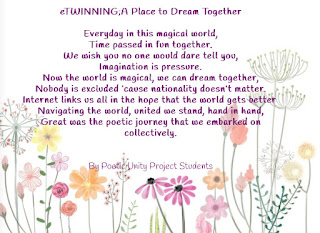Short Dictionary of Poetic Terms (Srednja škola Delnice)
Matija & Karlo
Short dictionary of poetic terms
|
Stylstic means of expression |
Short definition |
|
Stanza |
An arrangement
of a ceratin number of lines, usually four or more, sometimes having fiyed
lenght, meter and rhyme scheme |
|
Rhytm |
A strong
regual repeated pattern of movement or sound |
|
Verse |
Writing arranged
with a metrical rhytm typicall having a rhyme |
|
Rhyme |
Correspondence
of sound between words or the endings or words, especially when these are
used at the ends of lines of poetry |
|
Alliteration |
The
occurrence of the same letter or sound at the beginning of adjacent or
closely connected words |
|
Assonance |
Resemblance
of sound between syllables of nearby words, coming from the rhymining of two
or more stressed vowels but not consonants |
|
Motive |
Any
distinctive feature or idea that recurs across a story |
|
Anaphora |
The
repetition of word or phrase at the beginning of successive stanza |
|
Epistrophe |
The
repetition of a word or phrase at the end of succesive stanza |
|
Metaphor |
A figure of
speech in which a word or phrase is applied to an object or action to which
it is not literally applicable |
|
Metonymy |
The
substitution of the name of an attribute or adjunct for that of the thing
meant for example suit for business executive |
|
Allegory |
A whole
sotry, poem or picture that can be interpreted to reveal hidden meaning |
|
Onomatopoeia |
A word that
sounds like the noise it describes |
|
Personification |
The
attribution of a personal nature or human characteristics to something
non-human |
|
Irony |
The expression
of one's meaning by using language that normally signifies the opposite |
|
Sarcasm |
The use of
irony to mock or convey |
|
Hyperbole |
Exaggerated
statements or claims not meant to be take literally |
|
Antithesis |
A person or
thing that is the direct opposite of seomeone or something else |
|
Paradox |
A statement, pair
of statements, or even the exploration of an idea that seems contradictory upon
first glance. It will force the reader to take a deeper look into the story |
|
Rhetorical question |
A question
asked not for the answer, but for the effect |




Comments
Post a Comment